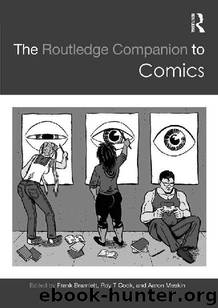The Routledge Companion to Comics (Routledge Companions) by Frank Bramlett Roy T Cook & Aaron Meskin

Author:Frank Bramlett, Roy T Cook & Aaron Meskin [Frank Bramlett, Roy T Cook & Meskin, Aaron]
Language: eng
Format: epub
ISBN: 9781317915379
Publisher: Taylor and Francis
Published: 2016-08-04T21:00:00+00:00
Against Definition
Among philosophers, the project of defining art and its various subcategories such as comics is a controversial one. Influenced by Wittgenstein’s discussion of games, Morris Weitz famously argued that neither art nor any of its ordinary sub-concepts (e.g. painting, theatre) could be defined (Weitz 1956). And although Weitz’s specific arguments are widely considered unpersuasive (Davies 1991: 9–22), the view that it is not possible to define art continues to find support (Gaut 2000; Dean 2003).
In the realm of comics studies, a number of scholars have, like Weitz, appealed to Wittgenstein’s notion of a family resemblance and rejected the possibility of a traditional definition of comics (Varnum and Gibbons 2001: xvi–xvii; Freedman 2011: 32–33). One problem with such views is that resemblance on its own seems like too blunt a tool to underwrite the category of comics (after all, as logicians like to say, everything resembles everything else in some way), but full-fledged family resemblance seems to bring necessary conditions back into the picture in a way that seems inconsistent with the Wittgensteinian and Weitzian picture (true family resemblances depend on ancestry). A deeper worry is that the unsuccessful nature of Weitz’s arguments for the indefinability of art raise a question about what the argument for the indefinability of comics might be. Varnum and Gibbons, for example, seem to offer no argument at all for the family resemblance view, while Freedman primarily appeals to Thierry Groensteen’s alleged claim that definitions of comics are doomed to failure. In fact, Groensteen does not argue precisely what Freedman claims he argues – Groensteen states that ‘any comic only actualizes certain potentialities of the medium’ (Groensteen 2007: 12), not, as Freedman claims, that ‘each definition’ actualises such (Freedman 2011: 32). And since, as discussed above, Groensteen offers an account that appeals to one allegedly necessary feature of comics – iconic solidarity – it is a mistake to treat him as holding a Wittgensteinian anti-essentialist view. Freedman also suggests that what we see when we examine the category of comics is simply a Wittgensteinian network of similarities, but this is clearly not enough to establish that there can be no definition of comics since there may be some defining features (e.g. a hidden essence) that underwrite that network. So is there any good reason for thinking a definition of comics is impossible? The inductive argument – ‘every attempt at defining comics up until this point has been unsuccessful, therefore every future attempt to define comics will be unsuccessful’ – does not seem especially persuasive and, at best, only provides evidence for the probability of the conclusion. Another possible route to the no-definition view is via contemporary theories of concepts that suggest that no (or very few) concepts of any kind are definable (Dean 2003).
Meskin (2007) argues against a wide variety of proposed definitions of comics, but he does not argue that definition is impossible. Rather, he argues that we do not need a definition in order to identify, evaluate and interpret comics (Meskin 2007: 375–376).
Download
This site does not store any files on its server. We only index and link to content provided by other sites. Please contact the content providers to delete copyright contents if any and email us, we'll remove relevant links or contents immediately.
4 3 2 1: A Novel by Paul Auster(12375)
The handmaid's tale by Margaret Atwood(7757)
Giovanni's Room by James Baldwin(7330)
Asking the Right Questions: A Guide to Critical Thinking by M. Neil Browne & Stuart M. Keeley(5759)
Big Magic: Creative Living Beyond Fear by Elizabeth Gilbert(5756)
Ego Is the Enemy by Ryan Holiday(5415)
The Body: A Guide for Occupants by Bill Bryson(5082)
On Writing A Memoir of the Craft by Stephen King(4935)
Ken Follett - World without end by Ken Follett(4723)
Adulting by Kelly Williams Brown(4566)
Bluets by Maggie Nelson(4548)
Eat That Frog! by Brian Tracy(4526)
Guilty Pleasures by Laurell K Hamilton(4439)
The Poetry of Pablo Neruda by Pablo Neruda(4097)
Alive: The Story of the Andes Survivors by Piers Paul Read(4021)
White Noise - A Novel by Don DeLillo(4006)
Fingerprints of the Gods by Graham Hancock(3996)
The Book of Joy by Dalai Lama(3976)
The Bookshop by Penelope Fitzgerald(3844)
